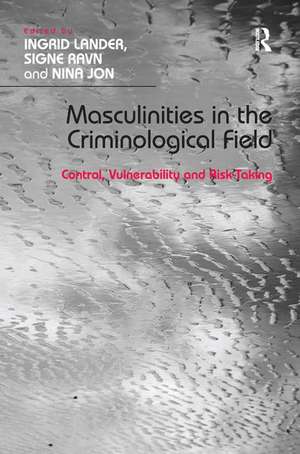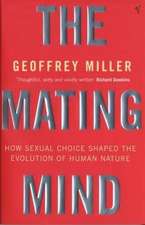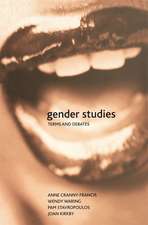Masculinities in the Criminological Field: Control, Vulnerability and Risk-Taking
Autor Ingrid Lander, Signe Ravnen Limba Engleză Hardback – 28 aug 2014
Preț: 767.57 lei
Preț vechi: 1104.76 lei
-31% Nou
Puncte Express: 1151
Preț estimativ în valută:
146.89€ • 159.50$ • 123.39£
146.89€ • 159.50$ • 123.39£
Carte tipărită la comandă
Livrare economică 22 aprilie-06 mai
Preluare comenzi: 021 569.72.76
Specificații
ISBN-13: 9781472410139
ISBN-10: 1472410130
Pagini: 268
Dimensiuni: 156 x 234 x 22 mm
Greutate: 0.64 kg
Ediția:New ed
Editura: Taylor & Francis
Colecția Routledge
Locul publicării:Oxford, United Kingdom
ISBN-10: 1472410130
Pagini: 268
Dimensiuni: 156 x 234 x 22 mm
Greutate: 0.64 kg
Ediția:New ed
Editura: Taylor & Francis
Colecția Routledge
Locul publicării:Oxford, United Kingdom
Recenzii
’Finally a book from Scandinavia on masculinities and crime! The editors bring together a fascinating diversity of perspectives into an intellectually powerful and provocative volume. Drawing on cutting-edge research, each scholarly chapter compellingly presents new material and/or new understandings of familiar material. This is an impressive volume that will be of much interest to a wide range of criminological, masculinities, and gender scholars.’ James W. Messerschmidt, University of Southern Maine, USA ’This collection is a thoughtful, thought-provoking analysis of the relationship between masculinities and crime. Presented as a "Nordic voice", it will have resonance beyond the bounds of Scandinavia. It is conceptually profound, empirically nuanced, and challenges those both within and without criminology who present gender as a simple or simplistic concept. It will undoubtedly become essential reading for anyone who claims to understand crime.’ Sandra Walklate, University of Liverpool, UK ’For decades, to study criminology meant to study men, who were so over-represented in the crime data as to be uninteresting. As a new generation of feminist scholars began to explore women's experience in all aspects of crime research, we began, at least to notice males, at least noting men's over-representation in crime, police, courts, and prisons. Now, finally, a new generation has begun to pose the fundamental question about gender - that is, what is the role of masculinity (our cultural ideas about men) that drives, informs and structures crime? This anthology adds to that new investigation, and, one hopes, criminology will never be the same again.’ Michael Kimmel, Stony Brook University, USA '... the book provides criminological studies that speak squarely to the difficult sociological questions posed by major social theorists like Connell, Butler, Kimmel and others. Taken collectively, this edition is therefore a fantastic contribution to a debate that
Cuprins
Introduction, Ingrid Lander, Signe Ravn, Nina Jon; Part I Negotiating Masculinities in Institutional Settings; Chapter 1 Transforming Cowboy Masculinity into Appropriate Masculinity, Nina Jon; Chapter 2 Doing Masculinity in Youth Institutions, Tove Pettersson; Chapter 3 ‘Be a Man. Not a Bitch.’ Snitching, the Inmate Code and the Narrative Reconstruction of Masculinity in a Norwegian Prison, Thomas Ugelvik; Chapter 4 Doing the Right Masculinities Right, Ingrid Lander; Chapter 5 The Construction of an Accepted Masculinity, Eivind Myhre, Øyvind Thomassen; Part II Vulnerable Masculinities; Chapter 6 Masculinity and Victimization, Veronika Burcar; Chapter 7 Armoured Toughness? Multicultural Group Relationships and Crime among Young Men, Päivi Honkatukia, Leena Suurpää; Chapter 8 The Narrative of Masculinity in False Reports of Rape, Marie Bruvik Heinskou; Chapter 9 Sexualized War Violence, Anette Bringedal Houge; Part III On the Edge of Control: Risk Taking and Masculinities; Chapter 10 The Dangerous Other? Towards a Contextual Approach to Men’s Risk-Taking with Motor Vehicles, Dag Balkmar, Tanja Joelsson; Chapter 11 Virtuous Fighting in Poker Gambling, Simon Simonsen; Chapter 12 Along the Lines of Boys and Girls, Sidsel Kirstine Harder, Signe Ravn; Chapter 13 Sex, Drugs and Masculinities, Lotta Pettersson, Christoffer Carlsson;
Notă biografică
Ingrid Lander, Signe Ravn, Nina Jon
Descriere
This volume both problematizes and renders visible conceptions and norms regarding male behaviour and masculinities, showing how these affect the criminological field through providing a theoretically sound and clear gender perspective to this field of research. With sections based around the following three themes: negotiations of masculinity in institutional settings; vulnerable masculinities; and risk-taking and masculinities, this volume will be of interest to scholars of criminology, sociology, social work and gender studies, as well as policy-makers, and law enforcement professionals.















